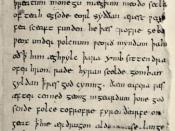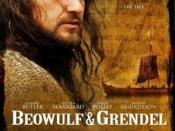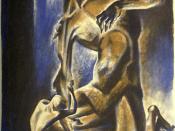Beowulf: "In the Path of Exile"
A truly noble warrior, the mightiest man on earth, a high-bourne and powerful person
leads his men through great battles. The distinguished one, the one who helps and counsels; he is
valiant and venturesome, showing extreme bravery and courage. He is the hero; he is the good.
Grim powerful demons of destruction prowl through the dark, haunting the marshes. These God-
cursed brutes, rule in defiance, gruesomely slaughter, mangle and murder, yet show no remorse.
They are the enemy; they are the evil. There is an important connection between the enemy and
the hero, without this connection the hero is never defined. The evil enemy has essential
characteristics which lead to Beowulf as a hero. Not only do the Dane, Geat and readers see him
as a hero, but most crucially he see's himself as a hero. I will argue the necessity of having an
enemy, in comprehension of evil versus good, and how there must in fact be some sort of
relationship between Beowulf and his enemies.
Beowulf's death at the hands of the enemy fully
defines Beowulf as a hero and because of this he is forever remembered in history.
Evil actions of the enemy are truly needed in each and every context in which a hero is
present. In this poem this author wants us to understand and grasp the enemy from the very
beginning. These creatures, dark death shadows, are against all; they are a threat, a danger to all
people and cause atrocious hurt, terror, turmoil and fear. These enemies help to define the hero; a
person worthy of respect, he is alert and preforms to the utter most, completing heroic feats with
bravery, strength and courage.
Beowulf wants to help the Danes and also prove...


